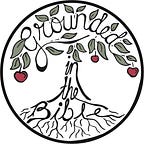If you want to receive Grounded in the Bible’s weekly Bible studies in your inbox each week, you can subscribe here! Join us as we "grow in the grace and knowledge of our Lord and Savior Jesus Christ."
In Part 1 of this lesson on “I AM the Good Shepherd,” we looked at the characteristics of sheep and shepherd. They tend to be the opposite. The shepherd is everything the sheep are not. The shepherd knows where to find good pasture and water; the sheep do not. The shepherd is a leader; the sheep are followers. The sheep are easy prey; the shepherd defends the sheep against predators. Sheep are known to wander away and get lost; the shepherd goes after the sheep and finds it. The one thing the shepherd and sheep have in common? They know each other. The shepherd knows the sheep by name, and the sheep know the shepherd’s voice and follow.

This week, we will look at the last two questions from our series related to Jesus’ I AM statement in John 10 that “I AM the Good Shepherd.” I’m going to post the whole passage again here for reference.
John 10:1-18: 10 “Very truly I tell you Pharisees, anyone who does not enter the sheep pen by the gate, but climbs in by some other way, is a thief and a robber. 2 The one who enters by the gate is the shepherd of the sheep. 3 The gatekeeper opens the gate for him, and the sheep listen to his voice. He calls his own sheep by name and leads them out. 4 When he has brought out all his own, he goes on ahead of them, and his sheep follow him because they know his voice. 5 But they will never follow a stranger; in fact, they will run away from him because they do not recognize a stranger’s voice.” 6 Jesus used this figure of speech, but the Pharisees did not understand what he was telling them.
7 Therefore Jesus said again, “Very truly I tell you, I am the gate for the sheep. 8 All who have come before me are thieves and robbers, but the sheep have not listened to them. 9 I am the gate; whoever enters through me will be saved. They will come in and go out, and find pasture. 10 The thief comes only to steal and kill and destroy; I have come that they may have life, and have it to the full.
11 “I am the good shepherd. The good shepherd lays down his life for the sheep. 12 The hired hand is not the shepherd and does not own the sheep. So when he sees the wolf coming, he abandons the sheep and runs away. Then the wolf attacks the flock and scatters it. 13 The man runs away because he is a hired hand and cares nothing for the sheep.
14 “I am the good shepherd; I know my sheep and my sheep know me— 15 just as the Father knows me and I know the Father—and I lay down my life for the sheep. 16 I have other sheep that are not of this sheep pen. I must bring them also. They too will listen to my voice, and there shall be one flock and one shepherd. 17 The reason my Father loves me is that I lay down my life—only to take it up again. 18 No one takes it from me, but I lay it down of my own accord. I have authority to lay it down and authority to take it up again. This command I received from my Father.”
3. What do we learn about Jesus from this statement?
This passage in John 10 tells us several characteristics about the good shepherd. We’ll look at each one and see how that relates to Jesus as the shepherd and us as the sheep from a spiritual perspective.
The Shepherd Knows the Sheep
John 10:14 says, “I know my sheep and my sheep know me.” This is a reciprocal relationship. Because the shepherd knows the sheep, he knows which sheep belong to him and which ones don’t. John 10:3 says that “he calls his own sheep by name and leads them out.” The shepherd doesn’t just know the flock in general. He knows each sheep by name. He can distinguish one from the other. He knows when one is missing. He knows the tendencies and habits of each one so that he can be there to step in to keep the sheep out of trouble. He knows when a sheep is acting out of character, and he checks to see if something is wrong and then takes care of it.
Because the sheep know the shepherd, they recognize his voice when he calls to them, and they follow him. In contrast, they don’t recognize the stranger’s voice, so they don’t follow the stranger. If the sheep know the shepherd’s voice, that means that the shepherd regularly talks to the sheep. Because the sheep trust the shepherd to lead them, this means that the shepherd’s words aren’t cruel or harmful. Harsh words tend to lead to harsh actions, and this would lead to the sheep not trusting the shepherd. The sheep trust the shepherd and follow him because they know that the shepherd has their best interests at heart.
Now think of Jesus as the good shepherd, and us as the sheep. This is supposed to be a reciprocal relationship. Jesus knows us, and he calls us by name.
Isaiah 43:1: But now, this is what the Lord says—
he who created you, Jacob,
he who formed you, Israel:
“Do not fear, for I have redeemed you;
I have summoned you by name; you are mine.”
Jesus knows us by name. He knows our tendencies and habits. He knows where we are likely to get into trouble, and he provides ways to escape temptation.
But are we doing our part in this? Do we really know our shepherd’s voice? In order for us to know our shepherd’s voice and to distinguish it from other voices, we have to spend time with Jesus. We have to read his word. We have to listen for his voice. We have to be willing to follow where he leads us rather than go our own direction.
The Shepherd Leads the Sheep to Green Pastures
John 10:9 says, “They [the sheep] will come in and go out, and find pasture.” How do the sheep find pasture? John 10:4 says, “When he [the shepherd] has brought out all his own, he goes on ahead of them, and his sheep follow him because they know his voice.” The sheep find pasture because the shepherd leads them there. The shepherd is the one who knows where to find the nourishment the sheep need—the food and water—but the shepherd also knows where the danger is and can lead the sheep away from it. If the shepherd does need to lead the sheep through danger, the shepherd’s presence is often enough to scare away any predators.
Jesus does the same for his sheep. He has given us his word to lead us to a full and abundant life. John 10:10 says, “I have come that they may have life, and have it to the full.” A shepherd doesn’t give the sheep a bunch of boundaries just to show his power and control over the sheep. He does it to keep them safe and healthy. In the same way, Jesus gives us commands to live by in his word to guide us into places of abundant life. He doesn’t give us commands just to show his power and judgment over us. He does it because he loves us and he wants to keep us from harm. And if we follow him, he will lead us to places where we can flourish and bring honor and glory to him.
The Shepherd Lays Down His Life for the Sheep
John 10:11 says, “I am the good shepherd. The good shepherd lays down his life for the sheep.” This is the underlying key point that Jesus is making in this passage. The shepherd cares for his sheep so deeply that he is willing to give his life for them. Jesus contrasts the good shepherd with the hired hand and the thief. The thief comes to steal and kill and destroy (John 10:10). The hired hand runs away at the first sign of danger rather than protecting the flock (John 10:12-13). The good shepherd does the opposite. He lays down his life to save the life of the sheep.
This is exactly what Jesus did for us. Jesus knew that as sheep, we had no capability to save ourselves from the enemy. If it was going to be us vs. sin, or us vs. the enemy, we would lose every time. As we learned in the previous lesson, the only way to salvation is through the gate—Jesus. Jesus gave us the ability to be saved, to be called his sheep, by dying for us to pay the penalty for our sins.
But Jesus says something very interesting when he talks about laying down his life for the sheep. The good shepherd doesn’t just lay down his life for the sheep. He also takes it up again.
John 10:17-18: 17 “The reason my Father loves me is that I lay down my life—only to take it up again. 18 No one takes it from me, but I lay it down of my own accord. I have authority to lay it down and authority to take it up again. This command I received from my Father.”
Do regular human shepherds have the ability to come to life again if they give their life for their sheep? No. So what is Jesus saying here? Jesus is claiming to have authority over life and death. Even if he dies, even if he lays down his life for his sheep, he has the ability to conquer death and come back to life. This is the resurrection. This is what gives the gospel power. Even before his death, Jesus is predicting his resurrection. And this is one of the things that triggers the Jews to say that Jesus is crazy.
The Shepherd Gathers All of His Sheep
John 10:16 says, “I have other sheep that are not of this sheep pen. I must bring them also. They too will listen to my voice, and there shall be one flock and one shepherd.” I don’t know how common it is in Israel and the surrounding area for one shepherd to have more than one flock of sheep. But here, Jesus is claiming that he has more sheep that are not of “this” sheep pen. What is “this” referring to? Jesus was saying that the Jews are of “this” sheep pen, but there are others who are not of “this” sheep pen. With this statement, Jesus is opening the door for non-Jews to be a part of his flock. And he knows these sheep just as well as he knows the Jewish sheep, and these sheep also know his voice.
Interestingly, Jesus also knows which sheep are not his. The Jews asked Jesus if he was the Messiah, and they wanted Jesus to respond clearly. This was how Jesus responded:
John 10:25-29: 25 Jesus answered, “I did tell you, but you do not believe. The works I do in my Father’s name testify about me, 26 but you do not believe because you are not my sheep. 27 My sheep listen to my voice; I know them, and they follow me. 28 I give them eternal life, and they shall never perish; no one will snatch them out of my hand. 29 My Father, who has given them to me, is greater than all; no one can snatch them out of my Father’s hand.”
Jesus clearly knows his own sheep, both those who are Jews and those who are Gentiles, and he clearly knows which sheep are not his. What is the distinguishing characteristic between these groups of sheep? Jesus’ sheep listen to his voice and follow him. Those who are not his sheep do not believe in him. Jesus will gather all of his sheep from all the ends of the earth, and he will give them eternal life. He will guard them and keep them safe from the enemy.
4. How should we respond?
The first choice we have to make about how to respond is whether we want to be one of Jesus’ sheep. The sheep in Jesus’ flock believe in him, know his voice, and follow him. The sheep outside of Jesus’ flock do not believe, do not know his voice, and do not follow him. Which one do you want to be?
If you decide you want to be in Jesus’ flock, if you place your faith in him, then your job as a sheep is to get to know your shepherd’s voice and follow him. How do we do that?
This might sound like a Sunday school answer, but read your Bible and pray. But it’s not just about putting in the time so you can check it off a list and say you’ve done it.
If you really want to know Jesus’ voice, you have to—deep down in your heart—really want to hear from Jesus as you are reading his word. You have to be listening for his voice when you pray. You have to take the time to meditate on his word and apply it to your life. You have to spend time learning about who Jesus is and what it means to follow him.
You should spend your day with him, even in the midst of all your other daily tasks. You should carry on a conversation with him all day every day. Losing awareness of the fact that Jesus is with you is what leads you astray. But by staying focused on him, you can listen for his guidance and follow him. This is what it means to know your shepherd’s voice.











